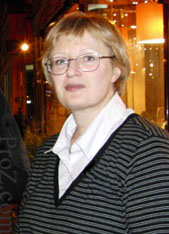Citation: is it the translator's responsibility to convert and entire bibliography? Thread poster: Peter Waymel
|
|---|
Peter Waymel
Italy
Local time: 21:57
Italian to English
+ ...
Hi,
I've accepted the project to translate an 800 page scholarly work in Italian on Liturgy. It has many citations, and roughly 50-60 pages of bibliography. The publisher has asked that I use the Chicago Manual of Style an issue that has come up regarding placement of periods before/after quotation marks... they have not specified whether they want the bibliography converted into CMS format... I'm seeing that the format for the footnotes used by this author is different from CMS fo... See more Hi,
I've accepted the project to translate an 800 page scholarly work in Italian on Liturgy. It has many citations, and roughly 50-60 pages of bibliography. The publisher has asked that I use the Chicago Manual of Style an issue that has come up regarding placement of periods before/after quotation marks... they have not specified whether they want the bibliography converted into CMS format... I'm seeing that the format for the footnotes used by this author is different from CMS format. I'm unsure whether
1. it's my responsibility to convert the format of the footnotes and the bibliography into CMS, and
2. whether it's normal to translate (putting the English translation in brackets after the original title) the title of every book and article into English in the bibliography. I don't think I've ever seen that. The bibliography is about 50-60 pp. of exclusively Italian and (some) Spanish works. It seems weird to me to look at a bibliography where the title of every single work, for almost 60 pages, is translated into English...
When translating books in the past, I have just used the citation format for footnotes used in the source text, and I think I haven't translated the bibliography, ever.
Any thoughts or knowledge about these two issues?
Thank you!
Peter ▲ Collapse
| | | |
Natalie 
Poland
Local time: 21:57
Member (2002)
English to Russian
+ ...
MODERATOR SITE LOCALIZER
But why don't you just discuss this with the client?
In case they need any conversion and you agree to do this, then charge them for additional time.
If they don't need this, just leave everything as is.
| | | |
| For this job it sounds like you should | Jul 3, 2016 |
On citation style: When it comes to non-fiction translation, it depends on the purpose of the translation. When I'm translating an academic article that's being submitted to a journal, I don't touch the citation style because each journal has their own preferences and that's usually done after the article has been accepted.
If I'm translating and preparing a book for publication, however, and have been specifically asked to use CMS, then it is my job to make sure that the citations ... See more On citation style: When it comes to non-fiction translation, it depends on the purpose of the translation. When I'm translating an academic article that's being submitted to a journal, I don't touch the citation style because each journal has their own preferences and that's usually done after the article has been accepted.
If I'm translating and preparing a book for publication, however, and have been specifically asked to use CMS, then it is my job to make sure that the citations and bibliography adhere to the style, too. For the bibliography work I would make sure to clarify with the client that I will charge that work by the hour and not by word/line.
On translating titles: No, I don't translate titles unless the client requests it or there's a specific reason. I'm actually translating a big report right now for an international organization, and I know that some readers will be very interested in the sources. I'm offering a translation in parentheses after the actual title, but again, that's not something I usually do.
When in doubt, talk to the client. ▲ Collapse
| | | |
| you must get precise instructions from publisher | Jul 4, 2016 |
Bibliographies can be a landmine if you don't clarify *exactly* what the publisher is expecting. If they say they want you to use Chicago Manual of Style formatting or any other style, they almost always mean the bibliography as well, and yes, they expect you to do the work of transforming the references into that style. But don't assume: ASK!
The formatting is actually the least of your concerns. For scholarly publishers, you would not be expected to translate any title unless it ... See more Bibliographies can be a landmine if you don't clarify *exactly* what the publisher is expecting. If they say they want you to use Chicago Manual of Style formatting or any other style, they almost always mean the bibliography as well, and yes, they expect you to do the work of transforming the references into that style. But don't assume: ASK!
The formatting is actually the least of your concerns. For scholarly publishers, you would not be expected to translate any title unless it has been published in English. But there's the hitch! You may well be expected to substitute the original reference with the one in the target language, especially if there are quotations used in the book you're translating. In other words, if the author relied on a book published in his or her own language, but that book also exists in the target language, you will probably be required to use all the information for the published translation. What that means is actually getting your hands on the target translation, finding the correct page number and quotation, and using the publication information (publisher, place, year, etc.) for the book in the target language.
I had to do this for a 400-page book once and it represented a horrendous amount of extra work that I hadn't counted on. Fortunately, I was near a large research library and could find all the physical copies of the target-language books, but I still had to search the pages for the exact quotation or page citation, with little to go on but educated guesswork. I got paid nothing extra for all that work. Nowadays, many quotations can be found online (often retrieved from Google's scanned books), considerably easing the work. But not all can be found that way, so you'll need the physical book in your hands. Ugh.
Some academic publishers will assume you know this; others may not but hope you won't notice until after the contract has been sealed in stone. One publisher I dealt with was intransigent about renegotiating any terms.
In another nonfiction book I translated (with hundreds of citations), this time for a nonacademic press, I stated in the contract that I would do this kind of work at an hourly rate. I put it especially high so that, when the publisher complained about how high my rate was and said they couldn't afford it, I explained that that was actually on purpose: I did not *want* to do this extra work and did not think the public buying the book would care. What we agreed on was that I would continue to use the original source citations, but add a translation of the title in brackets. It ended up looking awful, doubling the size of the footnotes and bibliography at the end. An academic publisher would never have accepted this approach.
An alternative would be to propose that the author or someone else hired by the publisher do all the legwork of finding the references in the target language, or else negotiating in your contract a fee for you to hire someone to do it for you. When I translate articles (not books) directly for academic authors, they usually agree to find the quotations in the target language publication, along with all the reference information, because it ends up being less expensive for them.
Just keep your eyes open. Let us know what solution you negotiate, okay?
[Edited at 2016-07-04 11:09 GMT] ▲ Collapse
| | |
|
|
|
Peter Waymel
Italy
Local time: 21:57
Italian to English
+ ...
TOPIC STARTER | Good suggestions | Jul 5, 2016 |
Hi,
Thanks to all for your suggestions. They are all good ones. To reply to a few points:
1. The liason at the publishing house had negotiated a per word rate for the whole book. As she converted the whole book from a pdf to a Word doc, I think she took the full word count, which includes the bibliography. So it seems they are paying me already for the bibliography. So really shouldn't balk at doing some work there. Now that I've read the suggestion to charge "per hour... See more Hi,
Thanks to all for your suggestions. They are all good ones. To reply to a few points:
1. The liason at the publishing house had negotiated a per word rate for the whole book. As she converted the whole book from a pdf to a Word doc, I think she took the full word count, which includes the bibliography. So it seems they are paying me already for the bibliography. So really shouldn't balk at doing some work there. Now that I've read the suggestion to charge "per hour" rather than "per word" for the bibliography, I kind of wish I had thought of that. The liason had already indicated that they're paying me the full amount that's been budgeted for this book, so I don't think I can re-negotiate. I will have to see how long it takes me to convert the bibliography from Italian scholarly to CMS format. If it's an egregious excess of time spent, then perhaps I'll say something.
2. The statement that the bibliography with the title translated and added in brackets looked awful and doubled the length is certainly a consideration. I'll mention that to the publisher. It is true, I've never seen that done in a translation of a scholarly work. So perhaps I'll not do that in the biblio. I'm still unsure as to whether to do that in the footnotes, but I think Natalie is right: just ask the publisher. I had covered this point with her before, and she said that's fine, but she might answer differently if she knew it's uncommon in the scholarly world and looks awful.
3. I'm aware of the obligation to find official translations, where they exist. But I'm pretty confident none of the articles being cited have been translated into English, just because of the field (Liturgy). But it's good to keep in mind and I'll check on the more "major-sounding" works. Thanks for the reminder.
I'll let you know what she answers, and what we end up deciding on. The brackets issue I'm particularly curious to see what CMS has to say about that. Should be easy enough to find. I'll let you know!
Thank you all for your tips; they've all been very good.
Regards,
Peter ▲ Collapse
| | | |
Peter Waymel
Italy
Local time: 21:57
Italian to English
+ ...
TOPIC STARTER | The Chicago Manual of Style answer: use brackets, and do sentence-style capitalization | Jul 5, 2016 |
Fascinating. Here's the CMS' answer (see 14.108 in the book):
"1 4 . 1 0 8 Translated title supplied by author or editor. If an English translation of a title is needed, it follows the original title and is enclosed in brackets, without italics or quotation marks. It is capitalized sentence-style regardless of the bibliographic style followed. {In running text, parentheses are used instead of brackets; see 11. 6 . ) See also 14 .110.
7 . Henryk Wereszycki , Ko niec soju... See more Fascinating. Here's the CMS' answer (see 14.108 in the book):
"1 4 . 1 0 8 Translated title supplied by author or editor. If an English translation of a title is needed, it follows the original title and is enclosed in brackets, without italics or quotation marks. It is capitalized sentence-style regardless of the bibliographic style followed. {In running text, parentheses are used instead of brackets; see 11. 6 . ) See also 14 .110.
7 . Henryk Wereszycki , Ko niec sojuszu trzech cesarzy [The e n d of t h e Three Emperors'
League] (Warsaw: PWN, 1977 ) ; includes a summary in German." "
So that's their answer. Curious because I imagine this format (CMS) is used for scholarly publications. I'll let the publisher know. And will let you know what they say.
Thanks!
Peter ▲ Collapse
| | | |
Parrot 
Spain
Local time: 21:57
Spanish to English
+ ...
Quite apart from what CMS says on the matter, it is not a translator's job to mislead readership into believing a translation exists where it does not.
Particularly not a scholarly readership. (Argue if you have to).
| | | |
| Only misleading if you replace title | Jul 8, 2016 |
Parrot wrote:
Quite apart from what CMS says on the matter, it is not a translator's job to mislead readership into believing a translation exists where it does not.
Particularly not a scholarly readership. (Argue if you have to).
You're right, of course, but it would only be misleading if you were to replace the source title, e.g.
Schmidt, Johann (2016): Meine Arbeit als Übersetzer [My work as a translator]. City: Publisher.
as compared to
Schmidt, Johann (2016): My Work as a Translator. City: Publisher.
In the second, you are misleading the readers, who will likely think the work is available in English. In the first, I think it's fairly clear that you're only offering a translation, and I would not find that misleading.
And thanks for the CMS stance on the formatting, Peter, good to know!
| | | |











